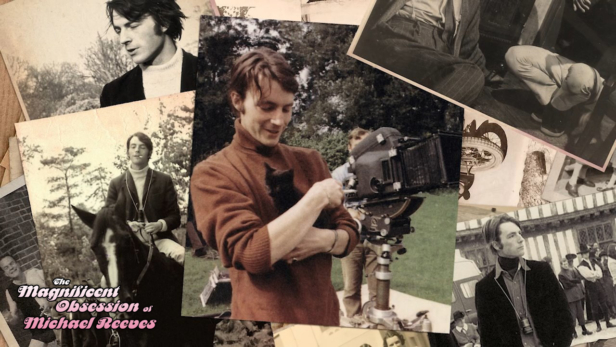British filmmaker Michael Reeves will always be associated with youth, not just because he had already directed three films – two of which were very good – by the time he was 24, but also because he died of an accidental overdose, in 1969, aged 25, ensuring that his youthful image remained forever fixed. His first feature Revenge Of The Blood Beast (1966), compromised by its minuscule budget and by ill-fitting comedy inserts from a second unit, was evidently not much liked even by its maker – and you can see the contributors to Dima Ballin’s documentary The Magnificent Obsession Of Michael Reeves straining to find much good to say about it. Yet his next, indeed last, two features, The Sorcerers (1967) and Witchfinder General (1968), would not only make Reeves’ name, but also, in different ways, play upon the ideas of youth and youth culture.
In The Sorcerers, young Mike (Reeves’ friend and acting regular Ian Ogilvy) is made guinea pig in an experiment being conducted by an elderly hypnotist (Boris Karloff) and his wife (Catherine Lacey), which enables them both to share, and even to control, Mike’s experiences from afar. It is not hard to detect here a reflexive element of metacinema, as outsiders, like a film audience, get to live someone else’s more thrilling life vicariously; more striking yet, though, in a film that takes us into the youthful heart of the Swinging Sixties and London’s psychedelic underground, is the generational conflict prominently on display, as Karloff, an actor associated with the Universal horror films from a much earlier era, is shown in an exploitative, almost vampiric relationship to new-kid-on-the-block Mike – who expressly shares his forename with his young director. Might this have been Reeves’ way of exploring his own, often restricted place in an industry where he may have been the next new thing in the director’s seat, but where there always seemed to be older people calling the shots?
The real witchfinder general Matthew Hopkins, when, during the English Civil War, he was opportunistically torturing and murdering his way through East Anglia for profit, was only 23 years old – something of which Tom Baker, Reeves’ co-writer on Witchfinder General, freely admits that they were unaware while making the film, relying as they were on a fictionalised account of Hopkins’ escapades by Ronald Bassett. American International Pictures imposed on Reeves their headline horror star Vincent Price, in his late fifties at the time. The two famously did not get on, with Reeves constantly having to rein in Price’s default mode of camp for what was a deadly serious production. This friction paid off, as Price comes to embody all the ills of an older establishment (and church) against which the counterculture – including Reeves himself – was setting itself. The treatment of Reeves’ film at the hands of the BBFC, then run by Reeves’ much older cousin John Trevelyan, reflects the atmosphere of witch hunt that was still dominating the UK in the late Sixities (contrast the US, where the film was released as The Conqueror Worm with no cuts).
In a familiar if well-managed format of archival clips and talking heads, Ballin’s documentary blends Reeves’ biography and filmography, Reeves’ surviving colleagues, including Ogilvy and Baker, are on hand to offer plenty of anecdotal angles, while a selection of film historians (including the ever excellent Kat Ellinger, who also wrote the documentary’s scenario) contextualise Reeves’ films, revealing what made them stand out so much from other British contemporary cinema, and what influence they would have on its future. The Magnificent Obsession Of Michael Reeves does have the feel of something you’d be more likely to watch as an extra feature on a DVD or Blu-ray than in a cinema, and indeed it may well have been intended as part of a home release – but that is not in any way to its discredit.
“I doubt these films would be that important if Mike hadn’t died,” suggests Ogilvy, in one of very few negative opinions expressed on Reeves’ work by any of the documentary’s contributors – but the impression remains that part of this driven, ambitious director’s tragedy is not just the small legacy of films, all striking in their time and each better than the last, which he left behind, but the potential of unfulfilled creativity to which they point, cut off so prematurely.
The Magnificent Obsession Of Michael Reeves was seen and reviewed at Arrow Video FrightFest 2019.
